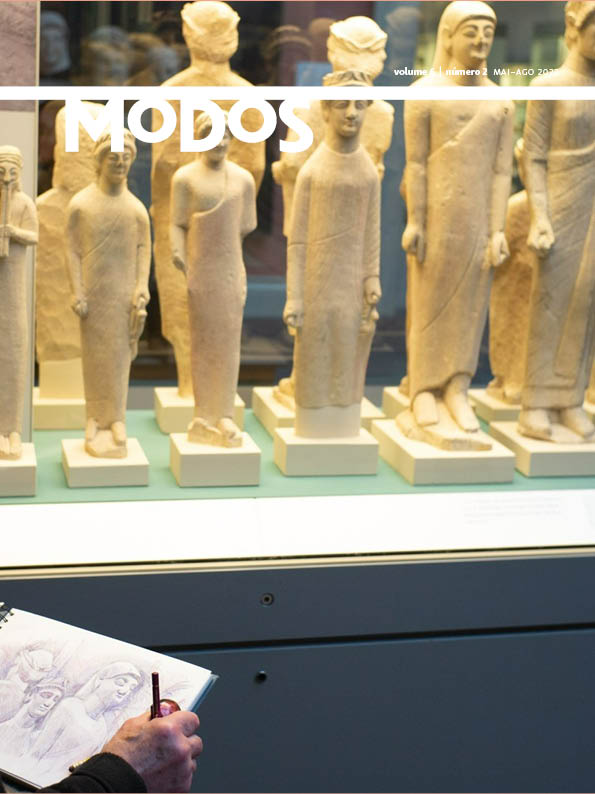Abstract
This article presents a set of experiments in the field of Art History with Artificial Intelligence technologies (computer vision) carried out within the scope of demonumenta, a research and university extension project that seeks to critically and creatively tension public memory policies. From the understanding that datasets and artistic collections are analogous practices, we questioned how to work in this intersection to subvert the normative assumptions that characterize the organization of art collections, databases and the discourses that their tools enunciate. We believe that part of this answer lies in the critical activation of public holdings to reshape the way we train machines today. Therefore, we created a dataset, based on the works of the Museu Paulista of the University of São Paulo (USP) available in its GLAM (Galleries, Libraries, Archives & Museums) in the Wiki projects. The systematization of this dataset was the basis for carrying out five analytical experiments with Artificial Intelligence algorithms. They are: Numerical Natures, Possible Landscapes, Color Archeology, Affirmative Album and Animated Ignorance. Such experiments evidence the colonialist continuum that elaborates the historical narrative based on normative visual parameters and patterns.
References
BARABAS, C. To Build a Better Future, Designers Need to Start Saying ‘No’. In: One Zero. 13 out. 2020. Disponível em: https://onezero.medium.com/refusal-a-beginning-that-starts-with-an-end-2b055bfc14be. Acesso em: 26 nov. 2021.
BEIGUELMAN, G. Políticas da imagem: vigilância e resistência na dadosfera. São Paulo: Ubu Editora, 2021.
BUOLAMWINI, J.; GEBRU, T. Gender shades: Intersectional accuracy disparities in commercial gender classification. In: Conference on fairness, accountability and transparency. PMLR, 2018. p. 77-91. Disponível em: https://proceedings.mlr.press/v81/buolamwini18a.html
CALLON, M. Techno‐economic networks and irreversibility. The Sociological Review, v. 38, n. S1, p. 132-161, 1990.
COULDRY, N.; MEJIAS, U. A. The Costs of Connection: How Data Is Colonizing Human Life and Appropriating It for Capitalism. Stanford: Stanford University, 2019.
CRAWFORD, K.; PAGLEN, T. Excavating AI. Disponível em: https://www.excavating.ai. Acesso em: 23 set. 2020.
CRAWFORD, K. Atlas of Ai: power, politics, and the planetary costs of artificial intelligence. New Haven: Yale University Press, 2021.
DELEUZE, G.; GUATTARI, F. Mil platôs: capitalismo e esquizofrenia. São Paulo: Editora 34, 2000.
DIFALLAH, D.; FILATOVA, E.; IPEIROTIS, P. Demographics and Dynamics of Mechanical Turk Workers. Proceedings of the Eleventh ACM International Conference on Web Search and Data Mining - WSDM ’18.
INTERNATIONAL CONFERENCE. Marina Del Rey, CA, USA: ACM Press, 2018. Disponível em: http://dl.acm.org/citation.cfm?doid=3159652.3159661. Acesso em: 24 set. 2020
FETTER, B. W. Das reconfigurações contemporâneas do(s) sistema(s) da arte. MODOS: Revista de História da Arte, v. 2, n. 3, p. 102-119, 11 set. 2018.
FINN, E. What algorithms want: imagination in the age of computing. Cambridge, MA: MIT Press, 2017.
FOUCAULT, M. As palavras e as coisas. São Paulo: Martins Fontes, 8ª edição. 1999.
HARAWAY, D. Situated Knowledges: The Science Question in Feminism and the Privilege of Partial Perspective. Feminist Studies, v. 14, n. 3, p. 575, 1988.
IRANI, L. The cultural work of microwork. New Media & Society, v. 17, n. 5, p. 720–739, maio 2015.
KOUTSOUKOS, S. S. M. Negros no estúdio do fotógrafo: Brasil, segunda metade do século XIX. Campinas, SP, Brasil: Editora Unicamp, 2010.
LATOUR, B. A esperança de Pandora: ensaios sobre a realidade dos estudos científicos. Editora da Universidade do Sagrado Coração, 2001.
LATOUR, B. Jamais fomos modernos. Editora 34, 4a edição, 2019.
LATOUR, B. On technical mediation. Common knowledge, v. 3, n. 2, 1994.
LIMA, S. F. DE; CARVALHO, V. C. DE. São Paulo Antigo, uma encomenda da modernidade: as fotografias de Militão nas pinturas do Museu Paulista. Anais do Museu Paulista: História e Cultura Material, v. 1, n. 1, p. 147-178, 1993.
LOBATO, P. Modos de ler, Modos de Desaprender – Os Livros e o Ensino de Arquitetura no Brasil. Dissertação de Mestrado, Escola de Arquitetura, UFMG. Belo Horizonte, 227 p., publicação prevista para 2021.
MINTZ, A. et al. Interrogating Vision APIs. Relatório do Smart Data Sprint. disponível em https://smart. inovamedialab. org/smart-2019/project-reports/interrogating-vision-apis, 2019.
MORESCHI, B. et al. The History of _rt, 2017. Disponível em: https://brunomoreschi.com/Historyof_rt.
NOBLE, S. U. Algorithms of oppression: how search engines reinforce racism. New York: New York University Press, 2018.
O’DOHERTY, B. No interior do cubo branco: a ideologia do espaço da arte. São Paulo: Martins Fontes, 2002.
O’NEIL, C. Weapons of math destruction: how big data increases inequality and threatens democracy. First edition ed. New York: Crown, 2016.
PARKER, R.; POLLOCK, G. Old mistresses: women, art and ideology. New edition ed. London: I.B. Tauris, 2013.
PASQUINELLI, M.; JOLER, V. The Nooscope Manifested: AI as Instrument of Knowledge Extractivism. Disponível em: http://nooscope.ai/. Acesso em: 20 set. 2020.
PEREIRA, G. Towards Refusing as a Critical Technical Practice: Struggling With Hegemonic Computer Vision. A Peer-Reviewed Journal About, v. 10, n. 1, p. 30-43, 13 ago. 2021.
QUIJANO, A. Ensayos en torno a la colonialidad del poder. 1a ed ed. Buenos Aires, Argentina: Ediciones del Signo, 2019.
RICAURTE, P. Data Epistemologies, The Coloniality of Power, and Resistance. Television & New Media, v. 20, n. 4, p. 350-365, maio 2019.
TURING, A. M. I.—Computing Machinery and Intelligence. Mind, v. LIX, n. 236, p. 433–460, 1 out. 1950.
WHOSE KNOWLEDGE. Re-imagining and re-designing the internet to be for and by us all. Report. 01 jan. 2021. Disponível em: https://whoseknowledge.org/wp-content/uploads/2021/04/WK-Prospectus-2021.pdf. Acesso em 26 nov. 2021.

This work is licensed under a Creative Commons Attribution-NonCommercial-ShareAlike 4.0 International License.
Copyright (c) 2022 Bruno Moreschi, Amanda Jurno, Giselle Beiguelman

